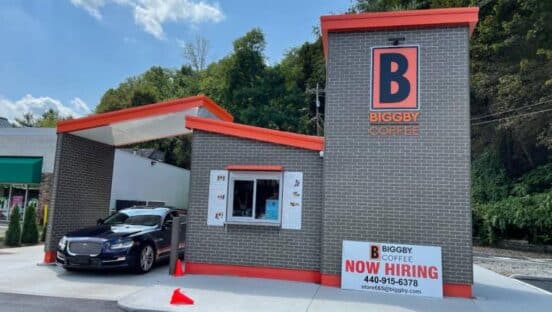Industry veteran Erin Kaylor decided not too long ago that retirement just isn’t for her—at least not yet.
For 21 years, she used her expertise around numbers to rise the ranks at McDonald’s, eventually reaching finance director of the U.S. portfolio. While in this role, Kaylor directed the team tasked with analyzing and reviewing development/construction decisions for 1,500-plus corporately owned and franchised restaurants. Her tenure saw improved performance in average unit cash flow, U.S. free-level cash flow, operating margin, and return on investment.
To shape what her next venture would be, Kaylor started with an eagerness to try try new things and welcome challenges. She wanted a job that would use her experience to impact the organization and the greater good. BIGGBY COFFEE, a roughly 360-unit beverage chain based in Michigan, appeared to be a natural fit. Her attraction to the brand started with cofounders and co-CEOs Bob Fish and Mike McFall, who have built a culture centered around people across nearly three decades of business. On BIGGBY cups there’s small print font that says “We love our coffee.” But underneath is bigger, more noticeable font that reads “We love the people behind our coffee even more.”
Additionally, the team works on managing direct farm relationships around the world. The chain currently sources 35 percent of its coffee from farm-direct partnerships. It’s an initiative first announced in February 2022. BIGGBY’s goal is to serve 50 percent farm-direct coffee by 2024 and 100 percent by 2028. The brand even created a program called “One BIGG Island in Space” in which Fish and his wife travel the globe and share stories behind the coffee farmers they encounter.
The mission resonated with Kaylor, who signed on to be CFO earlier this year.
“I think we’re here to make a difference, which is important to me,” Kaylor says. “So our vision is to improve workplace culture in America. And our core focus to do that is to support people in building a life that they love. So who doesn’t love that first of all? And if we’re supporting our staff and our franchise owners in that vision, then they in turn are touching the lives of their people and their customers every day with every cup of coffee that they serve.”
Kaylor was also attracted to BIGGBY’s growth prospects. The coffee chain wants to reach 1,000 locations by the end of 2028. It opened a net of 95 locations between 2020 and 2022, including 53 last year alone. To execute its long-term goal, annual unit growth will have to reach the triple digits, and Kaylor says BIGGBY has the demand to support that. Multiple new franchises are being sold weekly, further building the pipeline. According to the brand’s FDD, it projected 105 new franchised openings this year, including 40 in Michigan, 26 in Ohio, and 13 in Indiana.
“I think whenever you’re in a franchising organization, it’s important to remember that there are multiple stakeholders you need to balance,” Kaylor says. “It’s important to uphold organizational operating standards and brand consistency. But at the same time, you have to build relationships with your franchise owners, who really at the heart of it are just small business owners themselves. So I feel a responsibility not only to the financial health of BIGGBY COFFEE the organization, but I also feel it’s important that we’re giving a solid opportunity for those individual business owners to be successful as our franchise owners and our representatives in the marketplace.”
One of the biggest differences between McDonald’s and BIGGBY is the development process. At the coffee brand, franchise owners are responsible for site selection, lease negotiations, and the store buildout process. Corporate is there for support and has final approval for all locations, but operators are truly the ones driving development. In contrast, McDonald’s the corporation is the one orchestrating the process.
BIGGBY offers four store designs for franchisees—lobby and drive-thru, lobby only (1,200 square feet on average), drive-thru-only, and a kiosk model. The chain recently hired Bill Collins as the new director of site development to help operators sort through their growth options.
“I think in order to facilitate new locations at the pace that we plan on doing, we have to get a little smarter about the ways we support the store development process,” Kaylor says. “I think he’ll bring with him efficiency to improve the development process and get those buildouts done at a faster pace, but really at the same or reduced level of cost. So I’m excited about that. Additionally, we’re always just looking for banking relationships to support our franchise owners from a financial perspective to facilitate their growth along the way.”
Operators feel as if they’ve weathered the biggest part of the inflationary storm last year, Kaylor explains. It was a challenge determining how much consumers were willing to absorb, but now, franchisees think matters have started to level out.
The other obstacle is that BIGGBY franchisees aren’t the only ones optimistic about the post-pandemic environment. Several mid-sized beverage chains like Scooter’s Coffee, 7 Brew, The Human Bean, and Ziggi’s Coffee have similar franchise growth aspirations. Also, 80 percent of 160 senior industry leaders surveyed last year by World Coffee Portal’s Project Café USA 2023 report believe there’s solid growth potential for branded coffee shops in the U.S. That’s up from 63 percent before COVID.
Kaylor likes BIGGBY’s chances. The concept was founded in 1995, but she says it’s just getting started.
“First of all, we, we serve great coffee,” Kaylor says. “So I think that alone, in my opinion, is a competitive advantage. The coffee category already is filled with a multitude of players. But I think the relationship that we build with our customers, who we call fanatics, and how we serve our customers and our communities again is probably a secondary competitive advantage that I just don’t think many in the market can touch.”






